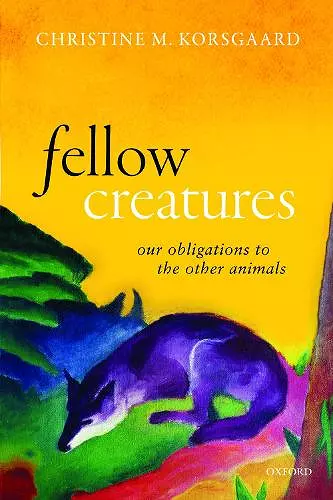Fellow Creatures
Our Obligations to the Other Animals
Format:Paperback
Publisher:Oxford University Press
Published:20th Jan '20
Should be back in stock very soon
This paperback is available in another edition too:
- Hardback£27.99(9780198753858)

Christine M. Korsgaard presents a compelling new view of humans' moral relationships to the other animals. She defends the claim that we are obligated to treat all sentient beings as what Kant called "ends-in-themselves". Drawing on a theory of the good derived from Aristotle, she offers an explanation of why animals are the sorts of beings for whom things can be good or bad. She then turns to Kant's argument for the value of humanity to show that rationality commits us to claiming the standing of ends-in-ourselves, in two senses. Kant argued that as autonomous beings, we claim to be ends-in-ourselves when we claim the standing to make laws for ourselves and each other. Korsgaard argues that as beings who have a good, we also claim to be ends-in-ourselves when we take the things that are good for us to be good absolutely and so worthy of pursuit. The first claim commits us to joining with other autonomous beings in relations of moral reciprocity. The second claim commits us to treating the good of every sentient creature as something of absolute importance. Korsgaard argues that human beings are not more important than the other animals, that our moral nature does not make us superior to the other animals, and that our unique capacities do not make us better off than the other animals. She criticizes the "marginal cases" argument and advances a new view of moral standing as attaching to the atemporal subjects of lives. She criticizes Kant's own view that our duties to animals are indirect, and offers a non-utilitarian account of the relation between pleasure and the good. She also addresses a number of directly practical questions: whether we have the right to eat animals, experiment on them, make them work for us and fight in our wars, and keep them as pets; and how to understand the wrong that we do when we cause a species to go extinct.
...this book contributes to a new era for animals, based on yet another firm moral foundation. * Nathan Nobis, society & animals *
a clear statement by someone who has spent much of her life working on these themes, continually trying to strip away inessential details that might prevent us getting to the heart of the matter * Peter Godfrey-Smith, Aeon *
an interesting, well-argued book. It should be read by any philosopher who works on animal ethics. * Toby Svoboda, Environmental Values *
"Christine Korsgaard has written an admirable book, accessible, cogently-argued, and thoughtful. She writes with bravery and humility, and perhaps most notably, with passion. It is evident that Korsgaard cares about the plight of animals, and yet the work is void of mawkish sentimentalism. All philosophers would benefit from a close reading; for any who are even remotely interested in animal ethics, reading Fellow Creatures is obligatory. . . . she is swimming against the tide. She is an outstanding swimmer, one of the most worthy animal advocates in the last half-century. . . . I strongly recommend reading this book. You and, I hope, your fellow creatures, will be better off for it." * Mark H. Bernstein, Notre Dame Philosophical Reviews *
"[Korsgaard] is one of the preeminent contemporary scholars of Kantian moral theory, so this is a significant book that will need to be referenced by anyone working on these issues. It is a must have for any college or university library." * CHOICE *
"To be sure, nature itself is hardly a Valhalla of peace and harmony. Animals kill other animals regularly, often in ways that we (although not they) would consider cruel. But there is no other creature in nature whose predatory behavior is remotely as deep or as widespread as the behavior we display toward what the philosopher Christine Korsgaard aptly calls "our fellow creatures" in a sensitive book of the same name." * Todd May, New York Times *
ISBN: 9780198854876
Dimensions: 234mm x 157mm x 16mm
Weight: 412g
272 pages